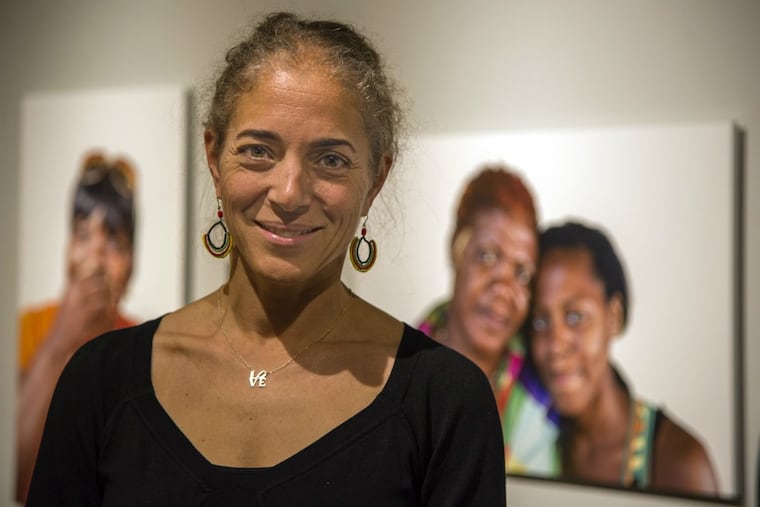For 2 Philly women, deadly 2010 Jamaica violence on exhibit at Penn Museum remains vivid
A new Penn Museum exhibition examines what happened in the May 2010 "Tivoli Incursion" in Kingston, Jamaica, when army and police forces raided the Tivoli Gardens neighborhood, looking for drug kingpin Christopher "Dudus" Coke, wanted for extradition by the United States. At least 75 people were killed.

Gilda Knott of Northeast Philadelphia clearly remembers when Jamaican army and police forces raided a Kingston neighborhood in May 2010 looking for a drug kingpin wanted for extradition by the United States. Over four days, at least 75 people were killed, and Christopher "Dudus" Coke couldn't be found.
"It was crazy," Knott, known as Miss Barbara, said in a phone interview Tuesday. "The people were scared to come on the road. People were scared to walk."
Knott, 70, who lived most of her life in Jamaica before moving to Philadelphia in 2000, was in her home country in May 2010 when her son-in-law was shot to death by police, she said, as tensions escalated between government security forces and Coke's supporters in the Tivoli Gardens neighborhood.
Stories of survivors from the so-called Tivoli Incursion are now part of a new Penn Museum exhibition, "Bearing Witness: Four Days in West Kingston," which looks at the traumatic onslaught by government forces that began May 24, 2010.
The exhibition at the museum at 3260 South St. provides a timeline, explores the aftermath of the state violence, and showcases audio recordings and portraits of survivors.
"What they want from this is that people know what happened to them," University of Pennsylvania anthropology professor Deborah Thomas, who co-curated the exhibition, said in an interview.
Thomas, 50, whose father is Jamaican and whose mother is American, was born in Milwaukee and spent her early childhood in Kingston. She had researched state violence in Jamaica for her 2011 film Bad Friday: Rastafari After Coral Gardens, about a 1963 incident in which Rastafarians were rounded up by the government, jailed and tortured.
In 2012, Deanne Bell, a psychologist now teaching at the University of East London, saw a screening of the film in New York and reached out to Thomas and musician Junior "Gabu" Wedderburn, who also worked on Bad Friday, to collaborate on a new project — collecting oral histories and examining what happened in the Tivoli Incursion. Bell and Wedderburn are co-curators of the exhibition. Five Penn students also went to Jamaica to record survivors' oral stories and shoot footage.
"We really saw it as providing a platform for people to talk about what they experienced during that week, and also to publicly name and memorialize … loved ones who they had lost," Thomas said.
Coke was not just a drug lord, but also a community leader and benefactor to his neighborhood. He became the leader of the Shower Posse drug gang after his father, Lester Lloyd Coke, burned to death in 1992 under mysterious circumstances while in a Jamaican jail cell awaiting extradition to the U.S. on murder and drug-racketeering charges.
In August 2009, the U.S. ordered the son's extradition after he was charged in federal court in New York with conspiracy to traffic narcotics and firearms. The Jamaican government initially stalled, but after the attorney general on May 18, 2010, signed an arrest warrant for Coke, days of escalating tension ensued.
The Penn exhibition shows how Coke's supporters began building barricades around Tivoli Gardens, and how government forces began surrounding the neighborhood. On May 23, Jamaican police broadcast radio and TV warnings for residents to leave, but many did not.
The next day, Army and police forces stormed into Tivoli Gardens and a four-day battle ensued between government forces and those loyal to Coke, while civilians shuttered themselves in their homes, the exhibition shows. Young men in particular were rounded up, some killed execution-style.
Knott's son-in-law, Errol Mitchell, 49, was outside his home near Tivoli Gardens, with his two young sons nearby, when he was fatally shot that May 23, Knott said. She said neighbors told her that police had shot him. "They were firing shots all over the place," she said. By the time she got to the hospital, her son-in-law, who worked as a security guard for a private company, was dead, she said. Her grandsons were not injured.
She and others had difficulty sleeping, and when they tried, they were afraid to rest on their beds for fear of bullets flying in, so they stayed on their floors, she said.
The survivors spotlighted include Marjorie Williams, 56, whose two sons were killed execution-style outside her home. She recalled how she was awakened by soldiers and police, who knocked on her door and ordered the males outside.
After Williams' two sons, Fernando Grant, 17, and Fabian Grant, 20, were taken across the road and ordered to kneel, and Williams was forced to go back inside, she said, she heard her younger son cry out, "'Mommy! Mommy! Mommy! Mommy! Mommy!'"
Then she heard him say, "'Mommy! They killed Pooksie!'" referring to his older brother. She said she realized her younger son was shot, too, when she no longer heard his cries.
The official count of those who died was 75, but residents contend the number slain during those four days was closer to 200.
A month after the incursion, on June 22, 2010, Jamaican police apprehended Coke at a roadblock, dressed as a woman. He was extradited to the U.S. two days later.
In August 2011, he pleaded guilty in New York federal court to racketeering charges, and the following year he was sentenced to 23 years behind bars. Now 48 and imprisoned at Fort Dix in New Jersey, he is scheduled to be released on July 4, 2030.
"Bearing Witness" is on display through July 15, 2018, at the Penn Museum, 3260 South St.